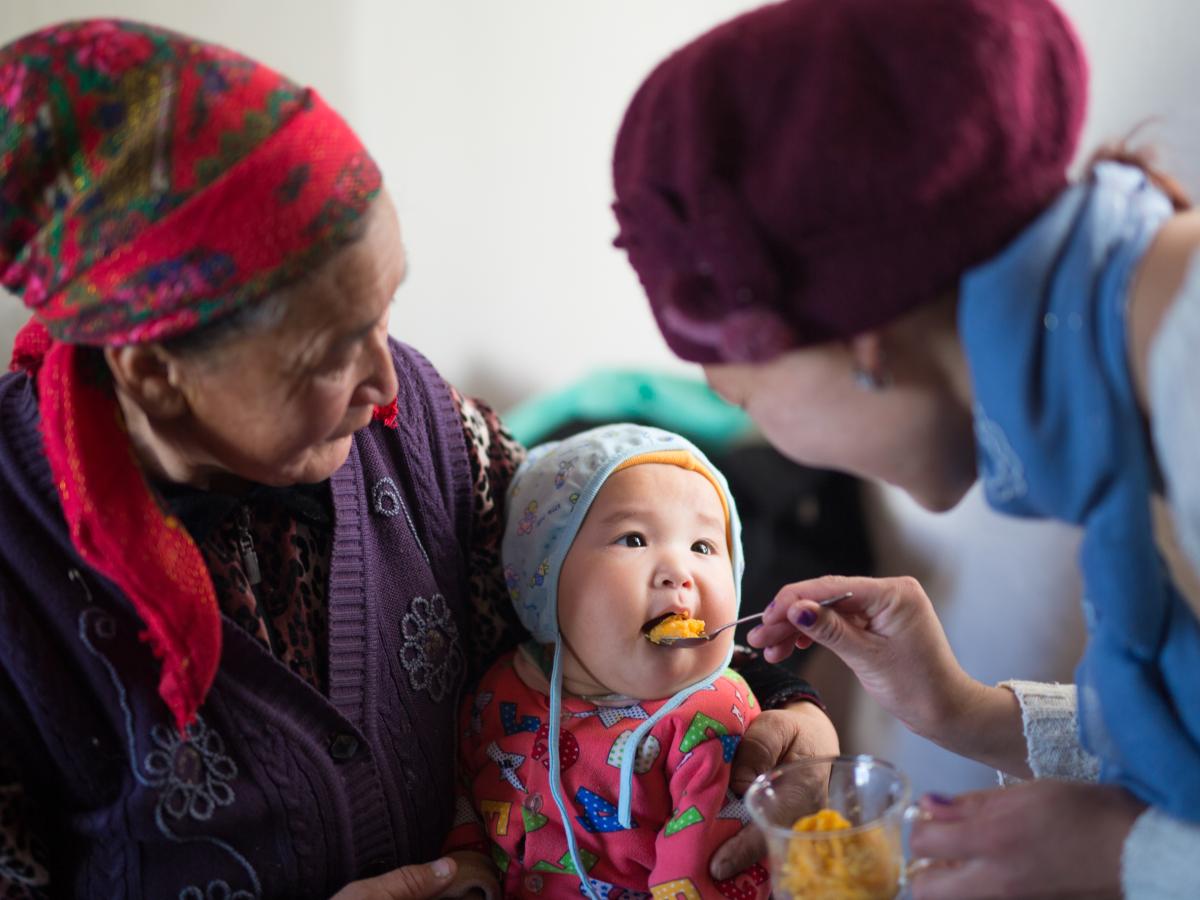2019 - 2023 | JSI Research and Training Institute, Inc. | $6 million
OVERVIEW
USAID Advancing Nutrition project aims to improve the nutritional status of women of reproductive age and children under 5 in the Kyrgyz Republic, with a specific focus on the first 1,000 days of a child.
GOALS
Malnutrition among children and women in the Kyrgyz Republic remains an urgent problem with negative long-term consequences for socio-economic development. According to the most recent National Integrated Micronutrient and Anthropometry Survey of the Kyrgyz Republic (NIMAS), one fourth of children under five (21 %), 25 % of women and almost half (49%) of pregnant women in the country suffer from anemia, 83.3% of women are folate deficient.
The project aims to:
- improve knowledge, attitudes, and motivation related to healthy nutrition practices, including increased use of facility-based nutrition services
- improve household demand for a variety of nutritious foods, while increasing access to these foods year-round
- improve the capacity of the health system to plan, deliver, and monitor nutrition services
- build the capacity of local institutions that deliver nutrition services
- advocate for improved policies and resource allocation for nutrition services.
KEY RESULTS
Policy level
Since 2018, the project has supported updates of several policies and technical guidelines ensuring that nutrition remains a priority for the health care system in the Kyrgyz Republic. For example, the routine health reporting system now includes nutrition counseling indicators to ensure better quality tracking and accountability of nutrition counseling by healthcare providers. The project helped to update the national anemia technical guidelines that included severe anemia treatment and diagnostics, and new recommendations for infant and young child feeding. The project also continues to support medical institutions in Batken, and Jalal-Abad Oblasts to make them baby-friendly through changes in management procedures, clinical practices.,
Training
Community volunteers are the backbone of the project. They talk directly with the families, pregnant women and mothers of young children informing them about improving nutrition and hygiene practices, building skills on a healthy diet, and food storage and preservation to make vegetables and fruits accessible throughout the year. Jointly with the Kyrgyz Association of Village Health Committees, the project team has trained over 2,500 community volunteers who reached more than 154,000 people in Batken and Jalal-Abad Oblasts since 2020.
The Advancing Nutrition team also works with health care workers so that they can provide better nutrition care for infants and mothers. The project trained over 1900 healthcare workers on best international practices of nutrition and breastfeeding who in turn provided counseling and nutrition services to almost 60,000 mothers, pregnant women, women of reproductive age and adolescent girls.
Public outreach
The project continues to promote nutrition and hygiene messages through its Facebook and YouTube pages, and partners with local television and radio in Batken and Jalal-Abad Oblasts to broadcast engaging, locally tailored nutrition and hygiene messages. Advancing Nutrition supported the Republican Center for Health Promotion under MOH in updating its social and behavior change and communications strategy.
Partnerships
The project works in close partnership with the USAID Окуу керемет! project, USDA Food for Education program (Mercy Corps), the APNIP project (World Bank), UNICEF, WHO, WFP, FAO, the “Perinatal Centre Bishkek. Accompanying Measures” project (KfW), and the Aga-Khan Development Network-funded activities. One of the key achievements was establishing multi-sectoral nutrition platforms in Jalal- Abad and Batken Oblasts promoting coordination of state and non-government actors’ efforts on nutrition and food security.
Research
Advancing Nutrition interventions are data-driven, and regular assessments measure baseline data and progress results. In addition, the project continues testing an addendum of responsive care and early learning content for infant and young child feeding counseling packages in the Kyrgyz Republic.
Gender
According to a recent research (2022) conducted by the project, participation, labor contribution, and the decision-making process in the household, particularly regarding nutrition-related behaviors, are subject to negotiation between men and women and across generations. To ensure greater gender equity, the project addresses gender norms and stereotypes on nutrition by including all caregivers in nutrition-related counseling and family budget planning, and involving men in childcare and feeding practices.
____
Project Duration: 2019-2023
Budget: 6 million
Implementing Partner: JSI Research and Training Institute, Inc.
Activity Locations: Jalal-Abad, Issyk-Kul and Batken Oblasts
USAID Contact: Aida Estebesova, aestebesova@usaid.gov
JSI Contact: Nazgul Abazbekova, nabazbekova@advancingnutrition.org

